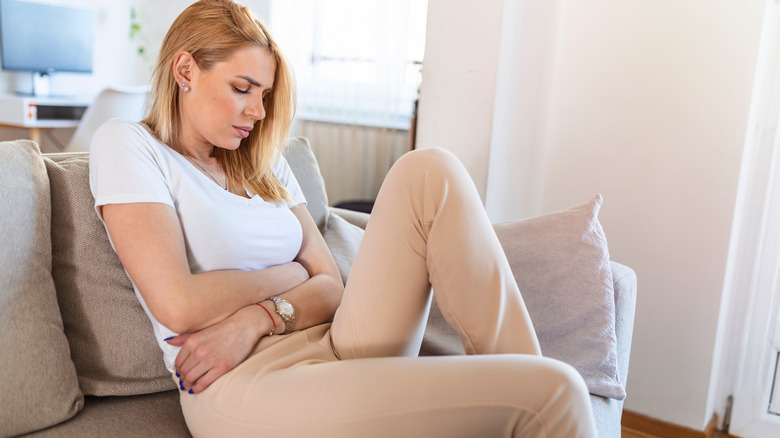What It Means When You Can Feel A Pulse In Your Stomach
When you intend to take your pulse to measure your heart rate, you tend to place your fingers on the inside of your wrist or one side of your neck next to your windpipe. Those are places you're more likely to feel your blood moving through these pulse points because they are close to your skin.
Sometimes you might feel a pulse in your stomach, which might feel weird; but, most of the time, it's normal. According to Healthline, what you're feeling is your aorta, which runs from your heart to your abdomen. The aorta is a chief artery that transports blood throughout your body. If you lay down on your back with your knees up, you could probably feel your pulse from your aorta. You might even see the pulsing if you don't have much abdominal fat. You might also feel that same pulse after you've eaten. More blood pumps through your aorta so your stomach and small intestine can do their jobs to digest your food.
If you're pregnant, that pulse might not be your aorta. It might be the heartbeat of your baby. Although these pulses in your stomach typically aren't a concern, there is one pulse in your stomach that might warrant a visit to the doctor.
When to be concerned about a pulse in your abdomen
Although your aorta can cause you to feel a pulse in your stomach, sometimes an area of this artery can expand like a balloon. According to MedlinePlus, an abdominal aortic aneurysm occurs when the wall of the artery becomes weak, so the blood presses out on the wall, enlarging that area of the artery. People who are at risk of an abdominal aortic aneurysm are those who smoke or have high blood pressure. You could also be at risk if you have a member of your family who has had an aneurysm. Men over 60 are particularly at risk for an aortic aneurysm if they also have one or more other risk factors. Doctors will use ultrasound or a CT scan to screen for aneurysms in men between 65 and 75, particularly if they have smoked.
Smaller aneurysms don't require surgery, but the larger ones are more likely to rupture. If you have internal bleeding or the aneurysm is larger than two inches, you'll need to have surgery.
You can prevent aneurysms by following an exercise program and a diet to improve heart health. Quitting smoking can reduce your risk of aneurysms. If you have high blood pressure or diabetes, be sure to take your medication to help manage these conditions.


